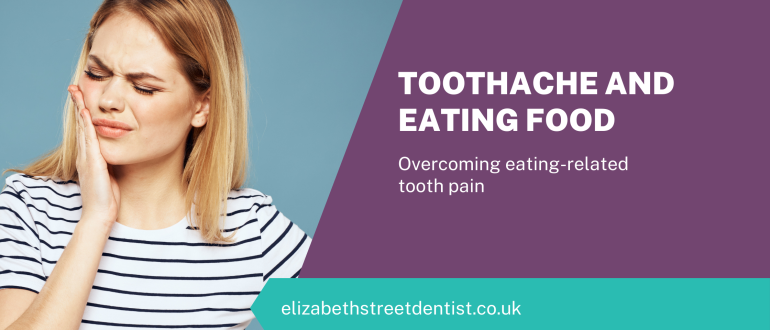
Toothache And Eating Food
Posted by: Dr Monica Amin
Our teeth are not just important for making us look beautiful; they also help us eat and speak. Unfortunately, if someone has pain in their teeth while eating or drinking, it can lead to general health issues, even malnutrition and weakness. Therefore, toothache-related problems should never be taken lightly. If you also suffer from pain in your teeth while eating, this article is for you. So, continue reading to learn various reasons for having toothache while eating and how to overcome these problems.
What Causes Tooth Pain After Eating?
If you have toothache after having a meal, it could indicate a problem with your gums and the periodontal tissues – the structures that support your teeth in the jawbone sockets. This type of toothache occurs when there is periodontal inflammation and the tissues have become sensitive. As a result, when you bite, these tissues receive pressure and due to being inflamed, causing a toothache. Another reason for having toothache after eating something is when something gets stuck between two teeth and generates pressure between them.Â
What Type Of Food Should I Eat When I Have A Toothache?
If you have a toothache while eating, you should avoid eating hard and sticky foods. Instead, eat a soft diet until the inflamed tissues heal properly. The National Health Service (NHS) recommends eating a soft diet such as:
- cereals
- porridge
- soup
- boiled vegetables
- mashed fruits
to prevent putting excessive pressure on the damaged tissues, thereby accelerating the healing process and minimising pain and discomfort while eating.
Why Do I Get Gum Pain After Eating Meat?
Having toothache after eating meat indicates that the food particles are being “wedged†into the spaces between adjacent teeth. In this situation, the wedged meat fibres put pressure on the teeth, causing pain and pressure. In some cases, the teeth appear higher than above, thereby disturbing the overall bite pattern. Besides causing pain, meat stuck between teeth can also increase the risk of dental complications like tooth decay and periodontal disease.Â
Why Are My Teeth So Sore After I Eat Hard Food?
Hard foods require a greater amount of work and force by your teeth to break them into smaller pieces – and digest them. Our teeth are suspended in their sockets by a fibrous network of tissues called the periodontal ligament. Whenever we eat, the biting force is also transmitted to the underlying periodontal tissues. In cases when the periodontal tissues are inflamed, they become painful on biting. The harder the food you eat, the more pain these inflamed periodontal tissues will cause, in addition to spontaneous gum bleeding. That is why dentists recommend eating a soft diet when you have underlying periodontal issues.
Can Food Get Stuck In Teeth Cause An Infection?
Food stuck between teeth can cause various long-term complications, such as tooth decay and gum disease. Since food impaction between adjacent teeth is very difficult to clean, the stuck food particles degrade in the oral cavity over time and form a thin layer over the teeth called the dental plaque. This plaque hardens over time and becomes dental calculus. Both plaque and calculus provide an ideal environment for harmful bacteria to breed and release toxins that damage the gums and periodontal tissues. So, food impaction between teeth initiates a chain of events that ultimately leads to periodontal infection.
What Is The Solution If Food Gets Stuck In Teeth Every Time I Eat?
If you get food stuck between your teeth every time you eat, this indicates that your jawbone that supports the teeth is gradually getting destroyed due to underlying gum inflammation. As a result, the space between adjacent teeth has broadened and promotes food impaction. This situation can be managed by initiating a strict oral hygiene routine through regular brushing and flossing. Besides, an interdental brush or Waterpik may also be used for optimal cleaning between the teeth. Furthermore, professional teeth cleaning should be sought to remove the plaque and tartar deposits from the teeth, thereby promoting the healing of the periodontal tissues.Â
What Are The Best Soft Foods To Eat After Dental Surgery?
It is not uncommon for the teeth and gums to become transiently sensitive and painful after a surgical procedure. Therefore, dentists recommend eating a soft diet while the healing of the surgical site is taking place. If you have recently undergone oral surgery, you should take soft foods like yoghurt, scrambled eggs, boiled vegetables, mashed fruits, cereals, and porridge for the next few days. This reduces the discomfort while eating and accelerates the healing process.
Why Does Severe Toothache Stop When I Eat Something?
Pain around decayed teeth or inflamed gums occurs because of inflammatory mediators. When we chew food, the muscles involved in eating are activated. As a result, the blood around inflamed gums, which contains pain-causing inflammatory mediators, is replaced with fresh blood. This is why pain around damaged teeth stops temporarily when we eat something.
Which Foods Are Bad For Teeth?
Generally, starchy, sugar-rich, and carbohydrate-containing foods like bakery products, chocolates, candies, caramel, and other sticky foods that promote plaque and tartar formation, should be avoided to keep our teeth and gums healthy. Instead, one should eat tooth-friendly foods like green vegetables, fruits, and high-fibre foods that provide a natural tooth cleaning effect.
Toothache can significantly affect one’s schedule and quality of life. But, the good news is that most cases of a toothache can be easily prevented with optimal oral hygiene care and regular dental visits. So, if you live in Elizabeth Street and you’re looking for a reliable dental practice for your family, Elizabeth Street Dentist should be your first choice. We offer all dental services at affordable rates and a comfortable and relaxing environment. So, book a virtual appointment with us today and let us take good care of your smile and oral health.Â
- Tooth Gems – Why You Should Avoid Them - 28th January 2024
- Why Do I Have Black Lines On My Teeth? - 31st December 2023
- Invisalign®. We Answer Some Of The Most Popular Questions - 28th October 2023

